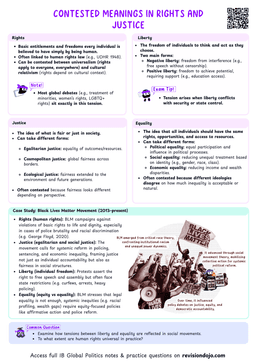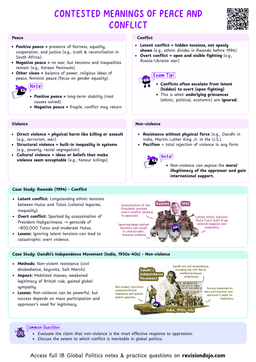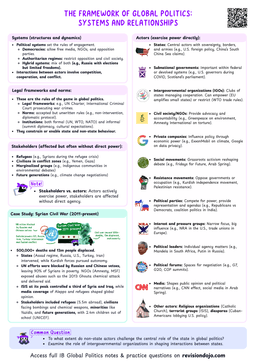Additional Types of Power
1. Structural Power
Structural Power
Structural power refers to the ability to shape the frameworks within which global politics operates. It influences how states, institutions, and individuals interact by setting the rules, norms, and structures that govern these interactions.
Key Aspects of Structural Power
- Economic Structures: Control over global trade, finance, and production systems.
- Example: The dominance of Western countries in institutions like the International Monetary Fund (IMF) and World Bank.
- Political Structures: Shaping international norms and governance systems.
- Example: The United Nations Security Council's permanent members (P5) have significant influence over global security decisions.
- Social and Cultural Structures: Promoting values, ideologies, and cultural norms.
- Example: The spread of Western democratic ideals and consumer culture through media and technology.
- The United States' role in establishing the Bretton Woods system after World War II is a classic example of structural power.
- By creating institutions like the IMF and World Bank, the U.S. shaped the global economic order to reflect its interests and values.
Significance of Structural Power
- Long-Term Influence: Structural power shapes the underlying conditions of global politics, making it more enduring than direct coercion.
- Indirect Control: It operates subtly, often without the need for direct intervention or force.
- Normative Power: Structural power can legitimize certain behaviors and delegitimize others, influencing what is considered acceptable in international relations.
- Structural power is often overlooked because it operates behind the scenes, but it is crucial for understanding how global systems are maintained and challenged.
- Identify a recent international crisis and analyze how different types of power were exercised by key actors.
- Consider the interplay between structural, relational, and productive power in shaping the outcome.
Implications for Global Politics
- Complexity of Power: Power is not monolithic, it operates through multiple channels and dimensions.
- Beyond Hard and Soft Power: Traditional distinctions between hard and soft power are insufficient to capture the full spectrum of power dynamics.
- Adaptive Strategies: Actors must navigate and leverage different types of power to achieve their goals in a constantly evolving global landscape.
- How do our cultural perspectives shape our understanding of power?
- Consider how different societies prioritize or interpret various types of power in global politics.
2. Cyberpower
Cyberpower
Cyberpower refers to the use of cyberspace, including the internet, computer networks, digital devices, and information technology, to create advantages and influence events. It includes activities such as cyber warfare, cyber diplomacy, and cyber espionage.
Modern Use
- Many states now treat cyberspace as a domain of warfare, developing cyber units to:
- Defend national infrastructure
- Gather intelligence
- Disrupt or disable the cyber systems of opponents
- Non-state actors, such as terrorist groups, hacktivists, and criminal organizations, also use cyberpower to disrupt services and steal information for their own purposes.
Cyber Espionage
- Cyberpower extends beyond traditional warfare. Cyber espionage allows states to collect intelligence on rival states and non-state actors. It is:
- Faster and cheaper than traditional espionage
- Difficult to trace and prevent
- In 2017, the WannaCry ransomware attack, widely attributed to North Korean hackers, targeted computers worldwide, including critical infrastructure like the UK's National Health Service (NHS), disrupting hospitals and medical services.
- Impact on Global Politics:
- The uneven access to cyber capabilities shapes global political dynamics. Digitally advanced states and powerful non-state actors can influence less technologically developed countries.
- As technology evolves and global interconnection deepens, cyberpower is becoming an increasingly important force in global politics.
3. Power-over, Power-to, and Power-with
Beyond Nye’s idea of power in global politics, experts focus on three important forms: power-over, power-to, and power-with.
Power-over
When one actor has control over another, forcing or coercing them into action.
Power-to
The ability of an actor to independently accomplish a task or goal.
Power-with
The ability of a group to work cooperatively toward a common objective.
- Key Thinkers:
- Mary Parker Follett:
She was the first to introduce "power-over" and "power-with."- Power-over is coercive and controlling.
- Power-with is cooperative and emphasizes collective action.
- Hannah Arendt:
- In On Violence, Arendt argued that "power-over" should not really be considered true power, if someone forces another to act through violence, it is not genuine power.
- True power, she said, happens through power-with, when people act together voluntarily.
- Hanna Pitkin:
- Pitkin developed the distinction between "power-over" and "power-to."
- Power-over happens when one actor makes another do something.
- Power-to is the ability to achieve goals independently, without necessarily controlling others.
- Pitkin developed the distinction between "power-over" and "power-to."
- Mary Parker Follett:
- Why it matters:
- Understanding these different types of power is essential in studying global politics.
- Power is central to political issues and challenges, and analyzing how it operates (whether through domination, ability, or cooperation) helps explain how change happens in global affairs.
- HL Extension: Technology
- Cyberpower, cyberwarfare, and cyber espionage are excellent topics for HL students to explore the global political challenge of Technology.
- Investigate how both state and non-state actors use technology to gain power and influence.
- Choose a specific example and analyze how the actor uses technology and why it is important.
- You can also connect this inquiry to other global political challenges, such as Borders and Security.


